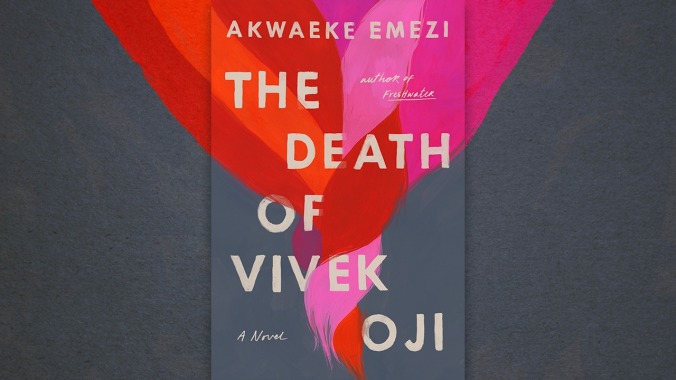The Death Of Vivek Oji’s story of family and care shines, but its mystery falls apart

Many novels begin with death, the threat of it, or its consequences. Perhaps the best and most famous example is Gabriel García Márquez’s masterful novella, Chronicle Of A Death Foretold. “On the day they were going to kill him,” the opening goes, “Santiago Nasar got up at five-thirty in the morning to wait for the boat the bishop was coming on.” A more recent entry is the opening of Celeste Ng’s riveting debut, Everything I Never Told You: “Lydia is dead. But they don’t know that yet.” These openings present similar questions: Why are these characters dead or doomed? Who are “they”? These books’ authors compellingly use these questions as the binding agents for their plots.
Akwaeke Emezi’s sophomore adult novel, The Death Of Vivek Oji, fits within this tradition. If the title didn’t make it clear, there is also this single-sentence first chapter: “They burned down the market on the day Vivek Oji died.” Emezi imbues their opening with the same questions Márquez and Ng did theirs, and adds additional force by ending the chapter there. It’s a gripping start and promises a propulsive novel.
In the next chapter, the first signs of the novel’s unstable construction show. There it starts to feel like the vision for the story never quite came together as it did for Emezi’s impressive debut, Freshwater (currently being developed for a TV show at FX, with Emezi writing). It begins, “If this story was a stack of photographs—the old kind, rounded at the corners and kept in albums under the glass and lace doilies of center tables in parlors across the country—it would start with Vivek’s father, Chika.” This second opening, hokey and jarring after the impact of what precedes it, mostly serves to place the idea of physical photographs in the reader’s mind, as they eventually become pivotal.
This is representative of the tension within the novel’s form, which is wide-ranging, covering an extended family and their community in Nigeria during the country’s political transition in the 1990s. The novel moves through time periods elegantly, and Emezi does a particularly good job building out the relationships that serve as the story’s foundation. But the book is less successful at being a page-turning mystery about, well, the death of Vivek Oji.
The family at the novel’s center includes Vivek’s parents, Chika and Kavita; his aunt and uncle, Ekene and Mary; and Ekene and Mary’s son (and Vivek’s cousin), Osita, who narrates a significant portion of the book. Vivek and Osita’s relationship is the story’s emotional core. When the teenaged Vivek begins mysteriously entering fugue states, it is Osita who is most caring and attentive. It is Osita who best seems to understand that these lapses are the product of a profound psychological pain, which Vivek explains early on in one of the handful of chapters he narrates: “I’m not what anyone thinks I am. I never was. I didn’t have the mouth to put it into words, to say what was wrong, to change the things I felt I need to change.” It is also Osita who is, other than Vivek, most humiliated by the fugues, as when Vivek unconsciously walks in on him having sex.
The relationship between the two cousins sours and they’re estranged for a few years until Osita, confronted with his mother’s belief that Vivek is possessed, makes an effort to reconnect. When he finds Vivek at a friend’s house, his cousin is gaunt and wearing a white caftan, his hair grown down to his waist, and with “something more insidious, something coiled in his eyes.” The cousins then have an almost supernaturally frank conversation, wherein Osita apologizes for his past behavior and confesses the fleeting desire he’d felt for other men. Soon enough the two are kissing.
This is a stirring and impressive section, as Emezi portrays the young men’s excitement and fear with clarity and precision. The pair, along with their friends Elizabeth and Juju, a lesbian couple, make safe havens for each other, the consequences of exposure rarely emphasized but haunting them constantly. It is within this bubble, the solace of it alongside the effort it takes to maintain, that the novel is at its strongest.
When this bubble is punctured, the air comes out of The Death Of Vivek Oji. When Emezi moves to focus more on Kavita and her search to understand what happened to her son, the writing slackens, the characters flatten, and the structure can no longer hold the weight of the point-of-view and perspective issues that have been piling up. Kavita interrogates anyone she can find, confronting them in a manner reminiscent of Meryl Streep’s frantic character stomping around Big Little Lies’ second season, demanding information about what happened to her son.
Up to that point in The Death Of Vivek Oji, Emezi revealed very little about the mechanism and circumstances of Vivek’s death. As the author begins undoing the mystery with cascading revelations, the shock is lessened by the sense that there is no character-based reason for Vivek or Osita to have concealed what they knew until then. Yet the gap is needed for the story to maintain its narrative tension. As the novel’s tragic closing plays out, Emezi having written perhaps the single most crushing version possible, it is difficult to shake the feeling that this information should have been revealed at the outset.
Emezi’s sophomore novel has much of what made Freshwater electric and what made Emezi a wonderful selection for the National Book Foundation’s 5 Under 35 list. Their strength for writing compelling characters with compassion and insight remains clear, but the flaws that ultimately hamper The Death Of Vivek Oji are those of ambition outpacing execution.
Author photo: Scottie O